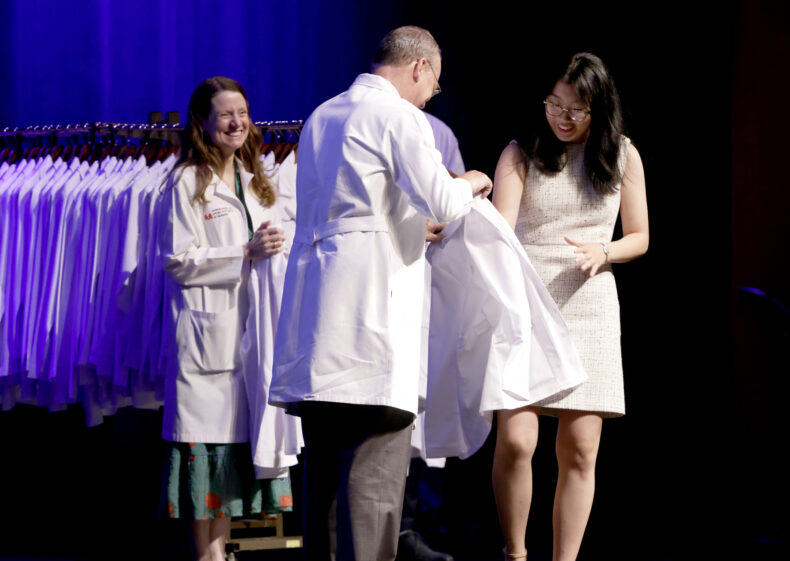
For the 91 members of the 140th class at Vanderbilt University School of Medicine (VUSM), the first day of medical school began on July 15.
But the official entrance into medical school was July 24 during the White Coat Ceremony — the traditional donning of the hip-length, crisp, white coats that mark the first-year medical students’ transition from college to professional schools.
Twenty-five years ago Vanderbilt was among a handful of schools that began hosting the ceremonial cloaking, which has become a ritual at most every medical school in the country.

“There seems to be a growing consensus that the transition from undergraduate to professional student is so momentous that it deserves a rite of passage; and also a growing recognition that the tenets of professionalism cannot be taken for granted and must be explicitly acknowledged and revered at certain key milestone moments,” said Bonnie Miller, M.D., associate vice chancellor for Health Affairs and senior associate dean for Health Sciences Education.
“As you cross the threshold into your medical training, you commit to a lifetime of service, to a compassionate understanding of the human condition and to the ideals of wisdom and virtue. These are the things that the white coat represents,” Miller told the class of 2019.

The incoming class was selected from a pool of 6,831 applicants and come to Vanderbilt from 28 states, four foreign countries and 56 undergraduate schools. The median GPA was 3.9 while the median MCAT was 37.
Sixteen of the students belong to groups that are underrepresented in medicine. Sixty-three percent of the class graduated with the most common science majors — Biology, Biochemistry, Neuroscience, Chemistry and Biomedical Engineering. Students also majored in Economics, Anthropology, History, English and Jazz Studies. Many of the students have already published research.
The admissions team led by Alice Coogan, M.D., and David Bader, Ph.D., admitted that each year selecting students from the strong applicant pool becomes more challenging.
“We have had outstanding classes over the past years and our students bring an incredible wealth of talent, energy and drive,” Coogan said. “VUSM provides a unique environment where students are concurrently challenged and supported to bring out the best in them. Our goal is to identify and recruit individuals who will use that environment to thrive.”

At the end of the ceremony students, along with their mentors, recited an oath originally composed by the faculty of the University of Namibia Medical School and modified for VUSM that detailed the obligations and responsibilities of learners and their teachers instead of defining those of a physician.
While Miller assured the class that they were not alone in their quest for a career in medicine, she cautioned the class about their new attire.
“Whether you are in Nashville or Namibia, New York or Nicaragua, white coats possess a very powerful symbolism,” she said. “They speak a universal language. They speak these expectations: that you are highly knowledgeable, expertly skilled and ultimately concerned about the welfare of others … wearing the White Coat is not an entitlement; it is a privilege that you must earn over and over again, every day of your professional journey.”











